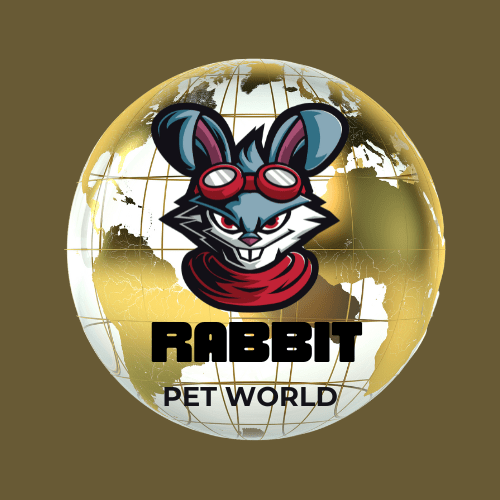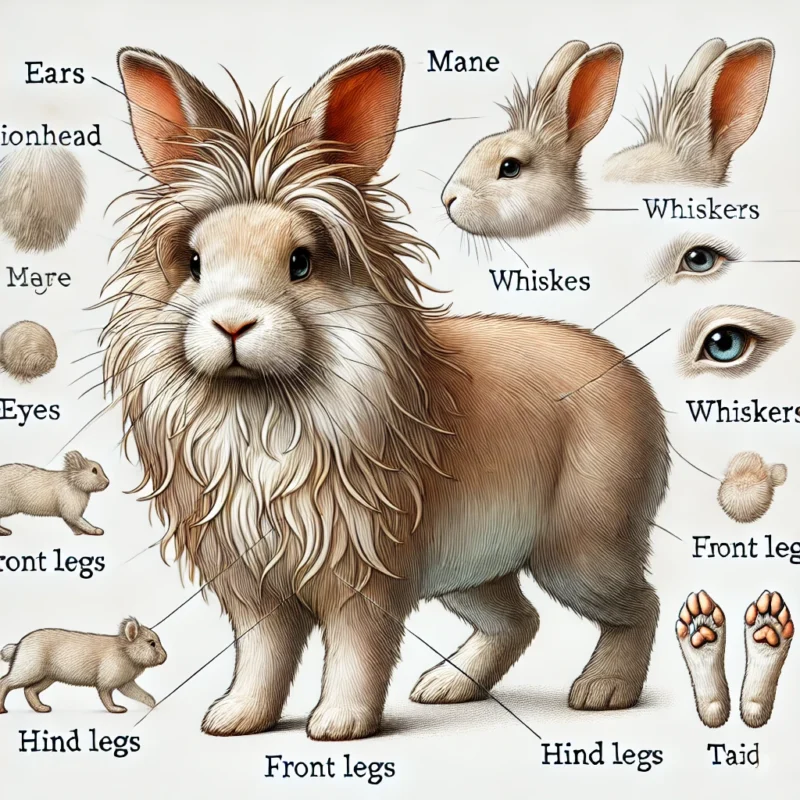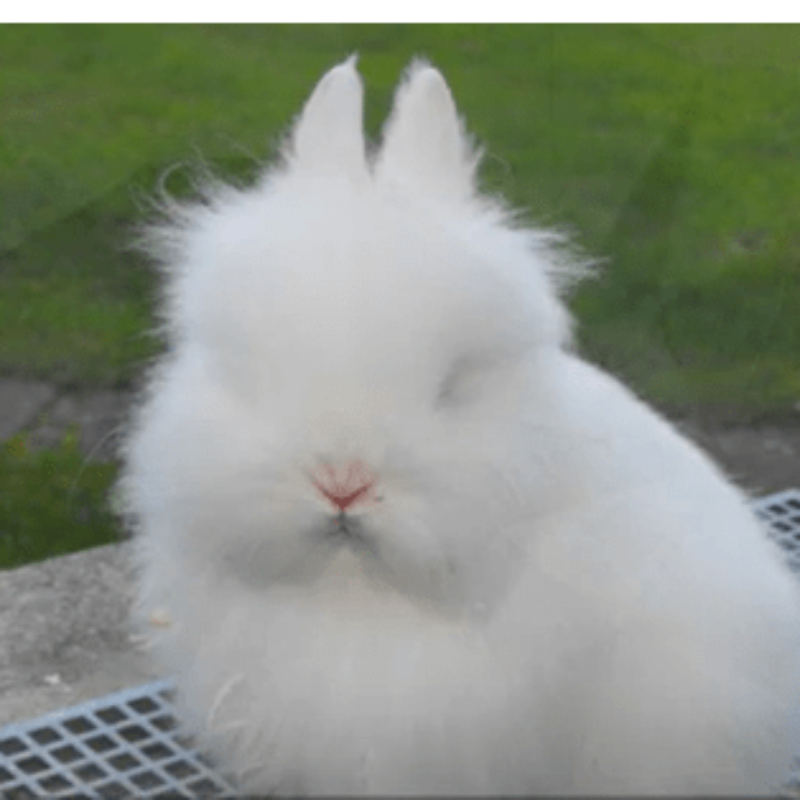- 1. The General Opinion About Lionhead Rabbits:
- 2. Actually, how big does a full-grown Lionhead Rabbit look?
- 3. Why does size matter, or is it necessary to know?
- 4. Full-Grown Lionhead Rabbit Care Guide:
- 5. Grooming Tips for Full-Grown Lionhead Rabbits:
- 6. Full-Grown Lionhead Rabbits Health Awareness:
- 7. Full-grown Lionhead Rabbit Feeding and Best Diet Practices:
- 8. A Beautiful home for your full-grown bunny:
- Outdoor housing for your lovely pet:
- 9. Why to Know the Behavior of Full-Grown Lionhead Rabbits:
- 10. Training Your Full-Grown Lionhead Rabbit for New Owners:
- 11. The Joy of Bonding with Your Full-Grown Lionhead Rabbit:
1. The General Opinion About Lionhead Rabbits:
Many people have opinions about or believe that full-grown Lionhead rabbits are expensive to maintain or very delicate because of their fluffy appearance. It could be accurate, but with little extra care, they are far from being feeble or complicated to manage.
In fact, with the right approach and proper knowledge, care management of a fully-grown Lionhead bunnies can be more accessible, and they could simultaneously be fantastic companions for families and singles.
Let’s investigate what makes this breed unique: their size, care, history, grooming, and everything you need to know. You will be surprised at how easy it is to keep a Lionhead rabbit happy and healthy!
2. Actually, how big does a full-grown Lionhead Rabbit look?
When you consider size, a full-grown Lionhead rabbit is often smaller than people imagine. This breed typically weighs around 2.5 to 3.5 pounds after reaching full-grown size. This criterion makes them one of the minor rabbit families, a trademark of their appeal, especially for people with limited space or place to keep them.
At full-grown size, their tight body is complemented by their signature fluffy single or double mane. But remember, their small structure could make you miscalculate! This rabbit family has a lot of energy, curiosity, and personality packed into its tiny frame.
Check this growth chart summarizing the sizes of male, female, and baby (kitten) Lionhead rabbits:
| Growth Stage | Average Weight | Length |
| Newborn (0-2 weeks) | 1-2 oz (28-57 g) | 3-4 inches (7.6-10.2 cm) |
| Transitional (2-4 weeks) | 4-6 oz (113-170 g) | 5-6 inches (12.7-15.2 cm) |
| Growth Stage (4-8 weeks) | 8-12 oz (227-340 g) | 7-9 inches (17.8-22.9 cm) |
| Adulthood (10 months) | 2.5-4 lbs (1.1-1.8 kg) | 10-12 inches (25.4-30.5 cm) |
Growth chart lionhead rabbit
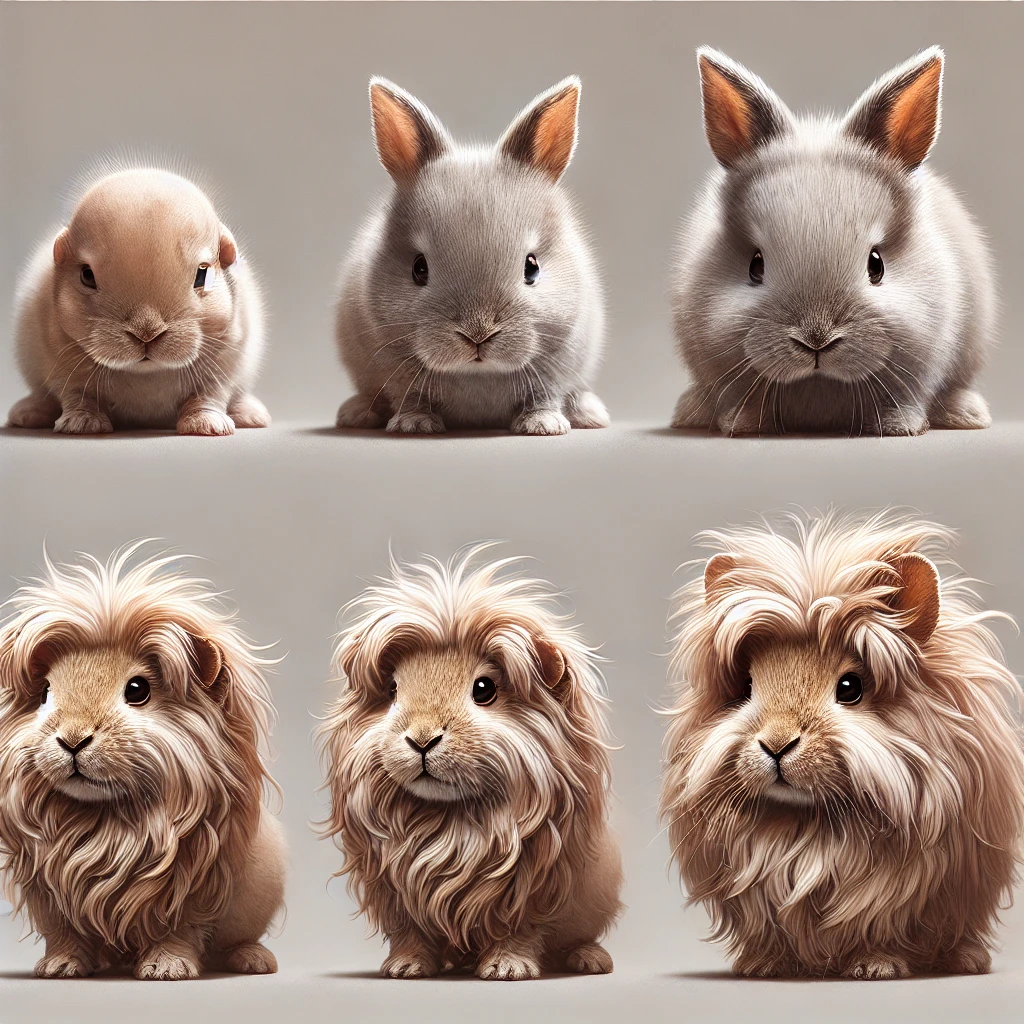
Additional Details Lionhead Rabbits:
- Male Lionhead Rabbits: They reach 3-4 pounds and are a bit larger than females, although the difference is minimal.
- Female Lionhead Rabbits: usually range from 2.5 to 3.75 pounds.
- Maturity and Full Size: Full-grown Lionheads usually reach their full size after 10 months.
- Double-maned Lionheads: Display their fur mane from birth, while single-maned types develop it later.
3. Why does size matter, or is it necessary to know?
Understanding the adult size of a Lionhead rabbit helps you to manage their housing, exercise, and care requirements. Consider the example of a smaller rabbit family like the Lionhead, which requires a medium/less space than the larger breeds, but these bunnies still need plenty of room to hop around and explore their activities. This rabbit family is solid in size, which makes them easier to care for and handle; it is a plus point for first-time rabbit owners.
Random Questions About Size:
- How big does a full-grown Lionhead rabbit get?
- How much should a Lionhead rabbit weigh as an adult?
Lionheads are classified as dwarf rabbits, which means this rabbit breed will always be smaller. This unique condition makes them perfect pets for rabbit lovers who are looking for easy care in smaller living spaces.
It’s also necessary to monitor their weight as they grow because sudden changes could indicate health care issues. So, be sure to weigh your rabbit occasionally. Ideally, they grow up to 10 to 12 inches( 2.5 to 3.75 pounds).
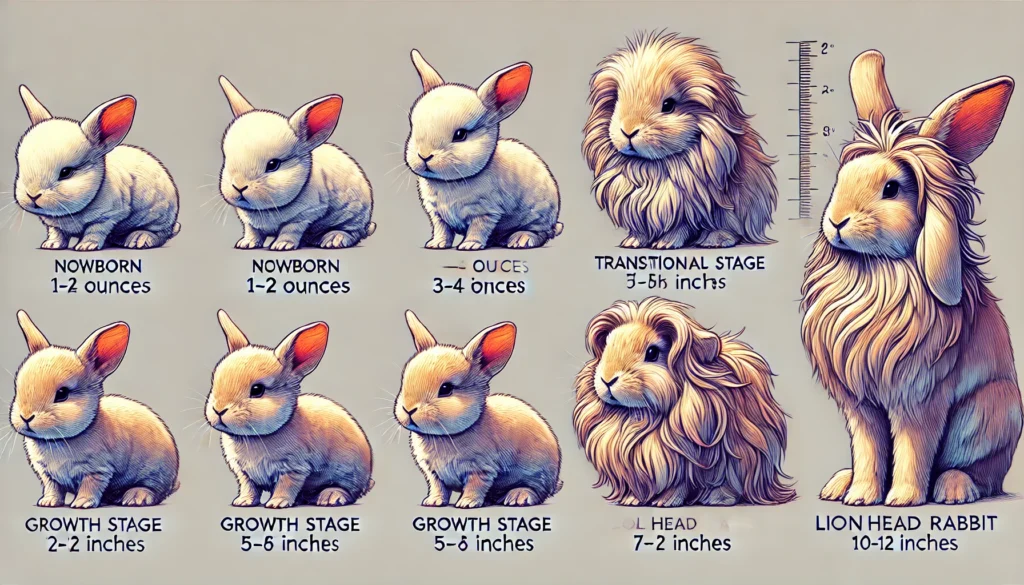
4. Full-Grown Lionhead Rabbit Care Guide:
Looking after a full-grown Lionhead rabbit is not as problematic as some think. Once the basics are down, it is just like routine and providing the conditional environment. Let’s break it down:
Housing Environment for Lionhead Bunnies:
Although lionhead rabbits belong to a small breed, they relatively need a suitable, spacious enclosure. Ideally, the rule is to ensure the cage is at least four times more extensive than the size of the rabbit so they have enough room to move and stretch themselves. Make sure soft bedding, like hay, is also part of their diet.
Necessary Diet for Fully Grown Lionheads:
A healthy Lionhead rabbit’s diet includes, without any limit, hay (which is a core food source), fresh green vegetables, and an ideal amount of high-quality pellets. Hay helps to wear down their teeth, which grow continuously, and keeps their digestive system healthy. Fresh water should always be available.
Exercise and enrichment Requirement for Lionheads:
Although Lionhead rabbits are small bunnies, they are energy-full and curious. They require time outside their cage daily to analyze, exercise, and connect with their surroundings. For their physical and mental health, it is necessary to provide them with essential toys and tunnels, and most importantly, it is time to run around and feel a free environment.
Considering these Lionhead rabbit care guides, you will keep your fluffy pet friend happy and healthy. Routine vet checkups, a proper diet, and daily one-on-one care are all part of ensuring your Lionhead has a long-lasting, enjoyable life.
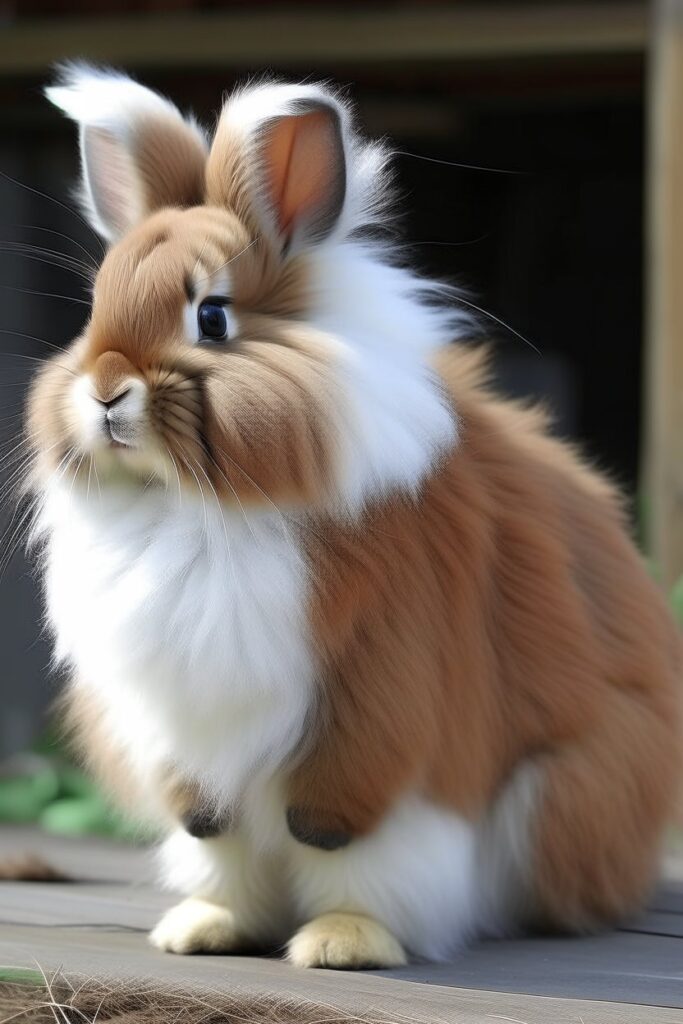
5. Grooming Tips for Full-Grown Lionhead Rabbits:
One of the most unique features of a fully-grown Lionhead rabbit is their beautiful, charming mane. This long, fluffy fur requires more grooming than other breeds, but it is not as difficult as it may seem. Here is just what you need to know:
Brushing schedule for full-grown Lionhead Rabbit:
Make a schedule to brush your Lionhead rabbit at least once weekly. But in shedding seasons, which usually happen twice a year, double the frequency to prevent matting and tangles. Their fur is devoted to knotting, especially around the mane; therefore, gentle brushing is a must practice. Use a soft-bristled brush or a wide-toothed comb to keep their coat in top condition.
How often should you groom a full-grown Lionhead rabbit? At a minimum, once a week, and more during shedding periods.
Bathing Requirement for Lionhead Rabbit:
Rabbits should never be bathed, unlike other pets. Your full-grown lionhead rabbit is a naturally clean animal and grooms himself regularly. Only spot cleaning with a damp cloth will be the better option when they get dirty.
Should I bathe my Lionhead rabbit? Absolutely not! Bathing can cause stress and health problems for rabbits. Stick to brushing and spot cleaning.
Trimming the nails of your pet Lionhead:
When it comes to shedding season, Lionhead rabbits lose a lot of fur. Brushing more regularly can help you manage the fur loss and prevent it from getting all over your house. Regular vacuuming will also help keep their cage home clean and clear.
- Pro Tip: Remember, when you notice your rabbit has bald patches or seems to be overshedding, it could be an indication of stress or a health issue, so it is time to consult with a vet specialist.
Reading more, remember that caring for and grooming a full-grown lionhead rabbit is satisfying and fruitful once you have the basic knowledge. Understanding their size information, providing excellent care, and managing their grooming requirements will ensure they live a happy, joyful, and healthy life. These rabbits belong to the cutest rabbit breeds, making your sweet home atmosphere a simile.
6. Full-Grown Lionhead Rabbits Health Awareness:
When it comes to health, full-grown Lionhead rabbits are usually booming, but similar to all pets, these bunnies can fall into specific health problems. By knowing your pet rabbit’s habitat well, you can understand signs of health issues early, and by encountering those issues timely, your rabbit stays healthy for years.
Dental Problems Face Lionhead Rabbits:
The most commonplace issue with full-grown Lionhead rabbits is dental problems. Because bunny teeth never stop growing, they can establish overgrown teeth if they do not have plenty of hay to chew on. Dental issues can lead to displeasure and even avert them from eating properly. Identifications to look out for include drooling, decreased appetite, or noticeable weight loss.
- How do you prevent dental issues in full-grown Lionhead rabbits? Ensure they have continued access to hay because chewing helps to wear down their teeth naturally.
Gastrointestinal Stasis Problems in Lionhead Bunnies:
Gastrointestinal stasis, or GI stasis, also known as ileus (the condition when stomach muscles and intestines do not work normally), is another health concern that affects your full-grown lionhead rabbit and could be a life-threatening condition.
This condition occurs when their digestive system slows down or stops. A proper, rich diet of fiber (from hay and leafy greens) is the primary source for preventing GI stasis. Symptoms include a lack of droppings, bloating, and loss of appetite. When you notice any of these signs, take your rabbit to a vet hospital immediately.
Ear Mites and Fur Mites:
It is understood that due to their dense mane and fur, Lionhead rabbits are more prone to mites than other rabbit families. Keep watching for continuous scratching, shaking of the head, or bald spots; it could be an indication of an infection. Timely grooming and spot-checking will help keep mites at bay. If you suspect mites, a veteran can prescribe the proper treatment for your pet rabbit.
- Tip: When your lion-head ages, it is necessary to visit your vet in a timely manner to avoid serious health complications.
7. Full-grown Lionhead Rabbit Feeding and Best Diet Practices:
Lionhead rabbits are herbivores, so their primary diet includes fiber-oriented foods, which keep their digestive process running smoothly, so a proper healthy diet for a fully grown lionhead is necessary for their overall health performance.
Hay, The Main Food Staple:
Hay is the most critical part of your rabbit’s diet. It should make up about 80% of what they eat daily. Hay not only keeps their teeth worn down but also aids in digestion. Timothy hay is the most common, but other options like orchard grass or meadow hay work well, too. Make sure your rabbit has continuous access to fresh hay at all times.
You know what your pet lionhead eats daily; it is 80 percent dependent on hay. Bunnies’ digestive systems and teeth could function smoothly because of hay. Infect orchard grass and meadow hay work well, but ideally, timothy hay is the most popular option for rabbits. For your end, make sure the availability of fresh hay at all times for your rabbits.
- Can full-grown Lionhead rabbits eat alfalfa hay? Alfalfa hay is best for feeding rabbit mothers and young rabbits because its ingredients have a lot of calcium and protein. but its not recommended for fully-grown Lionheads.
Fresh green vegetables are important:
For the good health of your pet lionhead rabbit, it is suggested that fresh green vegetables like cilantro, parsley, romaine lettuce, and kale be included in your lionhead rabbit’s diet plan. Offer green veggies to your pet rabbit slowly and with less quantity to ensure this diet plan does not upset your rabbit’s stomach and digestive system.
- Can a full-grown Lionhead rabbit eat vegetables? Try offering a small amount of carrots or bell peppers for a taste change, but stick to leafy greens for better rabbit health.
Pellets for your lionhead bunnies:
Keep in mind that veggies and hay are the core supplements of the rabbit diet plan. But for moderation, you can give them high-quality pellets which are high in fiber and low in protein. Moderation ‘, we mean a small amount that complements their vegetable and hay intake. Always use good-quality pellets. The suggested meal plan for your pet is ⅛ of a cup daily; remember, do not exceed the limit to prevent weight gain.
Treats and Fruits for Lionhead Rabbits:
However, it is common that lion-head rabbits love to eat sugary fruits like apples, blueberries, strawberries, papayas, grapes, oranges, and bananas, just like other pet rabbits. But remember, these fruits could be in a calculative quantity, and remember to remove seeds, peel, stem, etc. Because high sugar causes obesity in bunnies and digestive problems, the ideal plan for fruit treats is two or three days a week.
- Can full-grown Lionhead rabbits eat fruits? Of course, but remember only as a causal treat it could be a limited amount to avoid digestive issues.
By considering these Lionhead balanced diet measurements, you are demonstrating your knowledge and understanding of your full-grown Lionhead bunny’s food needs.
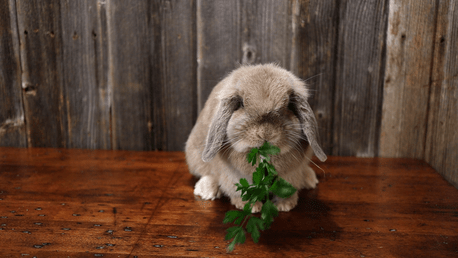
8. A Beautiful home for your full-grown bunny:
The core element that plays a vital role in your bunny’s healthy gestures and happiness is the suitable living environment. By providing a cozy and secure home, you are showing your attentiveness and consideration for your fully-grown lionhead rabbit’s needs.
Therefore, here are some suggestions for your lovely pet friend’s home building below.
Indoor housing for your best pet:
Usually, lionhead rabbit owners provide indoor homes for their pets to protect them from predators and other elements. However, consider that the cage or pen could be four times bigger than the size of your pet because lionhead rabbits require a lot of space for their joyful activities.
The cage home could have a solid bottom and avoid wire flooring. Manage the cage floor with soft bedding like hay or paper-based litter.
- What’s the best indoor housing for a full-grown Lionhead rabbit? While a significant and well-ventilated pen or cage is the best for free movement and stretching.
Outdoor housing for your lovely pet:
Some lionhead bunny lovers prefer to keep their pets in outdoor homes. But here are some issues to tackle: the cage and hutch should be waterproof, weatherproof, and predator-proof.
Other elements to consider regarding pet house setup are that it should be raised off the ground, have complex locks, have plenty of shade in the summer, and have solid measurements for cold winter seasons.
Because your pet bunny’s outdoor living exposed them to fleas, mites, and some other parasites, in this case, regular cleaning checks are recommended.
- Can full-grown Lionhead rabbits live outside? Why not fulfill the requirements like a secure, weatherproof hutch and cage to protect them from predators and high atmospheric temperatures.
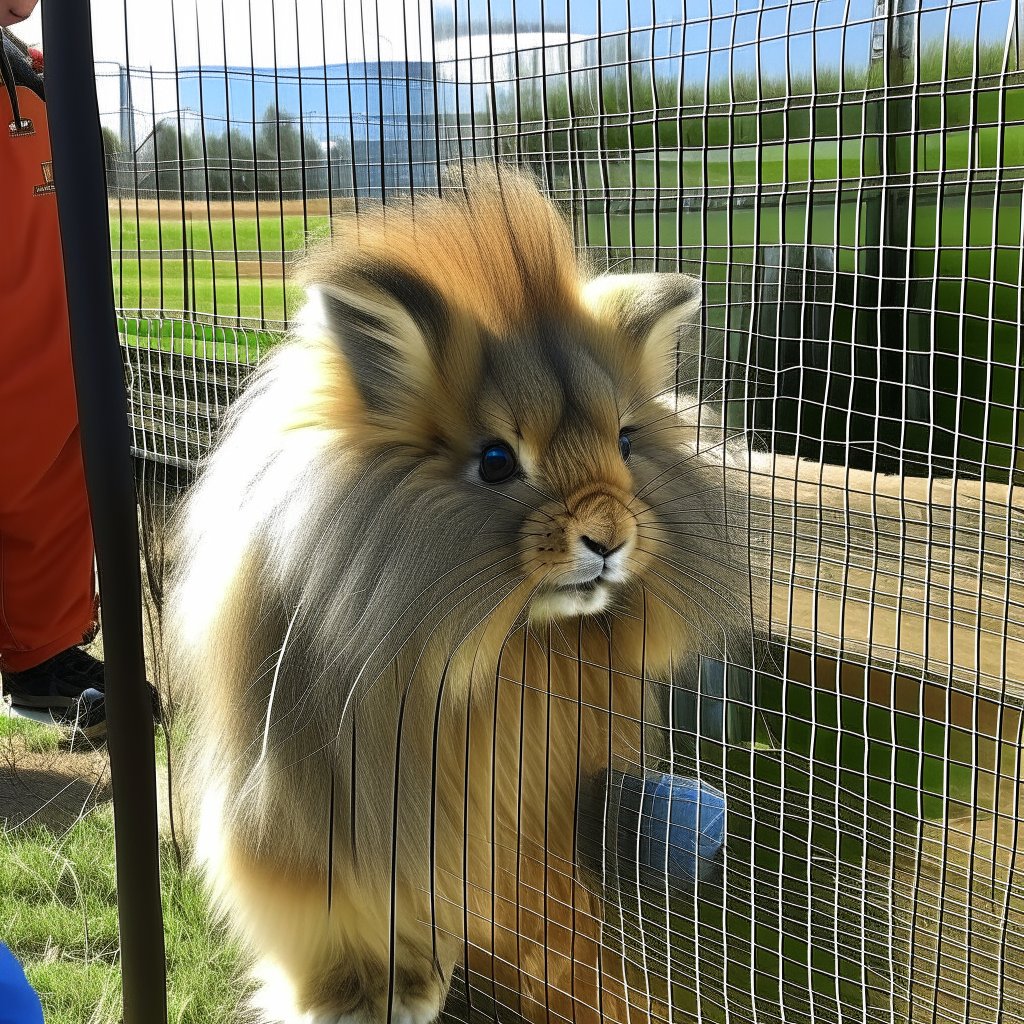
Exercise space for your pet friend:
Besides keeping your full-grown lionhead rabbit indoors or outdoors, these bunnies need plenty of space to exercise and hop around, so the main issue is to set up the living space in a highly secure and peaceful area.
If a setup is indoors, ensure the area is clean from electric wire and anything toxic, because their habit of chewing can harm them. If a living setup is outdoors, then make sure the enclosure is safe from predators.
Exercise is a very important element in rabbit life; if they do not run around, they get sick and have more health issues like obesity and boredom. So, exercise is a core element in preventing rabbit behavioral issues.
How much exercise does a full-grown Lionhead rabbit need? They daily need a few hours of supervised playtime, whether this playtime is in a free open area or a safe cage; the exercise is crucial for their physical and mental health.
Toys and Enrichment for Your Family Bunny:
abbits are very smart. They love to play with toys; give them with a variation of toys, such as tunnels, chew toys, and treat puzzles, which keep them entertained. Remember, enrichment keeps your pet rabbit happy and mentally fit; on the other hand, it prevents destructive behaviors like chewing furniture or digging.
- What toys are best for full-grown Lionhead rabbits? Wooden chew toys, cardboard tunnels, and treat-dispensing puzzles are great for keeping your rabbit occupied.
A comfortable, enriching environment ensures your Lionhead rabbit stays happy and healthy. Always make sure they have a cozy, secure space to rest and plenty of time to explore and interact with their surroundings.
9. Why to Know the Behavior of Full-Grown Lionhead Rabbits:
Full-grown Lionhead rabbits are known for their unique characteristics, and understanding their behavior is critical to forming a solid bond with them; these little fluff balls can sometimes be playful, curious, and even a bit quirky! Now, it’s time to explore their behaviors and what they mean.
Social Animals Lionhead:
Lionhead rabbits are social creatures and keen on interaction with their human companions and other pets. If left alone for long periods, they can become bored and even depressed. To keep your Lionhead bunny happy, spend time with them daily. Playing, petting, and letting them explore your home can create a strong bond.
- Do full-grown Lionhead rabbits need company? They can be socialized with humans; many owners choose to have a pair to keep each other company.
Litter training for your pet:
Many full-grown Lionhead rabbits can be litter trained; when you purchase from a reputed breeder or rescue organization, they have already worked on it, which is a game-changer for indoor pet owners.
If your pet rabbit is not litter trained, do not vary; place a litter box in a corner of their cage where they usually go for a washroom and use rabbit-safe litter. Most rabbits will naturally choose one spot for their bathroom needs.
Secondly, urine or pet droppings should be put in the litter box to encourage them to use it. Over time, this will make cleaning up much more manageable and keep their living area fresh.
- How do you litter train a Lionhead rabbit? Consistency is key! Place the litter box in their favorite corner and reward them for using it.
Behavioral cues of Lionhead rabbits:
Understanding your pet rabbit’s body language is very important; they make some behavioral cues to convey their message to you. So when your pet friend’s ears are held high, that means they are high alert while flopping onto their side, which means they are in a very relaxed and comfortable position.
If they are thumping their hind legs, this signals that they are scared or not happy. There are many more body signs they can do, like boxing, butt twitch, circling and cautious, etc. Knowing these cues can help you address their needs and emotions more effectively.
- What do different rabbit behaviors mean? Your pet bunny expresses their feelings and emotions with different postures and actions, so you must understand these signs to respond appropriately.
Binky and Zoomies of Lionhead Rabbits:
One of the cutest behaviors you will witness is when a full-grown Lionhead rabbit does a “binky,” which is a joyful jump and twist in the air.
That means your rabbit is happy! Similarly, “zoomies” are when they dart around the room, showing off their energy. Both behaviors indicate that your rabbit feels safe and happy in their environment.
- What does it mean when a Lionhead rabbit binkies? It means they are super excited and feeling great!
10. Training Your Full-Grown Lionhead Rabbit for New Owners:
Training your Full grown Lionhead rabbit friend can be a joyful and rewarding experience. In general perception, rabbits cannot learn quickly, but it could be surprising that pet rabbits can learn commands and tricks just like dogs! Here are some tips for enjoyable and practical training:
Instructions that can change your pet friend:
Start teaching with simple basic instructions, like calling them “come on” at the time with hand movement; indicate to them that you will call them towards your side, just like “sit here.” Use a treat to encourage them to follow your hand or respond to your voice instructions. Remember, patience and a lot of practice are vital, as rabbits learn on their own. Always use positive reinforcement; provide treats to your pet to encourage them for their good behavior.
- How do you train a Lionhead rabbit? Continue with one order at a time, let them complete it, reward them, and keep sessions short and fun.
Use clicker training to increase behavior:
To increase your pet rabbit’s good behavior, use the clicker technique. This procedure can be highly effective for pet rabbits. When your full-grown Lionhead rabbit acts the desired action, click the device and reward them immediately with a treat.
This helps them associate the click sound with positive reinforcement. What is clicker training for rabbits? It’s a method where a clicker signals that they did something right, followed by a treat.
Encourage interaction with yourself:
Training should not just be like training them for litter or other instructions and commands. Infect it with long-term relationships and bonding time with your rabbit by encouraging interaction and play with you.
Use toys or tunnels to engage their natural instincts to make these interactions fruitful. Your performance not only makes training more enjoyable but also powerfull your relationship with your pet friend.
- Can you train a Lionhead rabbit to do tricks? Why not! With some patience and practice, you can achieve your desired action. Usually, rabbits can learn tricks conveniently, like hopping through hoops or playing fetch.
Patient and wait while tranining:
Training takes time, so be patient with your Lionhead rabbit. If your pet seems uninterested or overwhelmed, take a break and try again later. Keep your training sessions short, about 5 to 10 minutes, so your pet feels fun and engaging.
- What if my rabbit seems to want to avoid learning? Sometimes, they need more encouragement. Try different treats or activities to find what excites them.
11. The Joy of Bonding with Your Full-Grown Lionhead Rabbit:
Establishing a mighty bond with your full-grown lionhead rabbit is the priceless and most rewarding aspect of rabbit ownership. So here are some tips that would change your relationship with your rabbit friend and can more deeplyen that connection.
Spend Quality Time Together:
As we know, lookout and kindness are potent elements, so with these characteristics, you spend time with your rabbit, and these lovely creatures trust you more. Therefore, your lionhead bunny’s unconditional trust built a strong bond with you. Sit near your pet friends and allow them to come to you and also play with their favorite toys together. Give them Permision to explore your space and just watch their behavior.
- How do I bond with my Lionhead rabbit? connect with them through gentle petting, playtime, and allowing them to explore safely.
Recognize fulll grown lionhead preferences:
Every creature have specific likes and dislikes, so rabbit family have same nature, maybe some lionhead bunnies enjoy being cuddled, while others refer to runing around their own. Knowing and learning aspects which are enjoys your lionhead rabbit is depending on time.
spend your value able time with your pet rabbit , offer them treats, toys and specific types of petting, which can closed bond with your pet.
- What should I do if my rabbit does not like being held? value their boundaries. Instead, engage them with play and activities that make them feel comfortable.
Create a Safe Alone Space for Your lionhead pet:
Safe and secure environment makes your lionhead feel more proud. Create a secure area for your pet where they spent alone time. This secure area could be a separate corner of your home or a specific hideout in rabbit cage.
- How can I make my Lionhead rabbit feel safe? Ensure hiding spots,provide comfortable bedding, and a calm atmosphere free of loud noises.
Celebrate Their Uniqueness:
Every full-grown Lionhead rabbit has a personality all their own. Celebrate the little quirks that make them unique. Whether it’s their favorite spot to lounge, the way they interact with toys, or their funny hops, these characteristics are part of what makes having a rabbit such a joy.
- Why is it important to recognize my rabbit’s personality? Understanding their unique traits helps you tailor your interactions and care to fit their needs.
By focusing on their behavior, training, and the joy of bonding, you’ll create a fulfilling relationship with your full-grown Lionhead rabbit. Each interaction is a chance to build trust and enjoy the fun quirks that come
